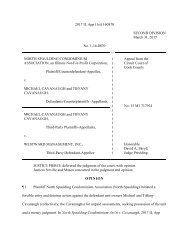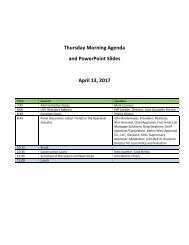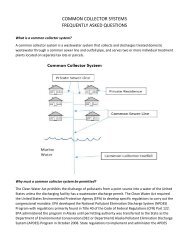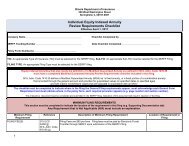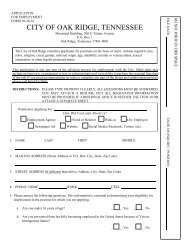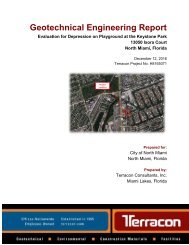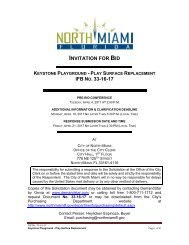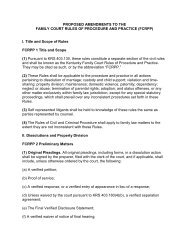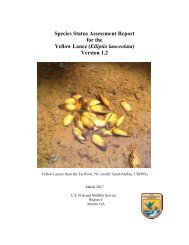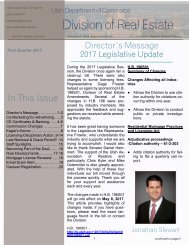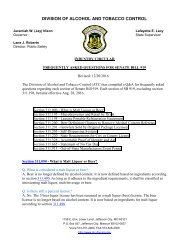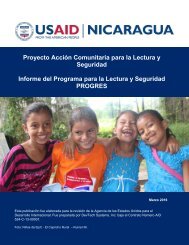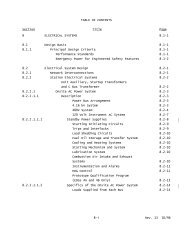201611_cfpb_Access_Funding_Complaint_filed
201611_cfpb_Access_Funding_Complaint_filed
201611_cfpb_Access_Funding_Complaint_filed
You also want an ePaper? Increase the reach of your titles
YUMPU automatically turns print PDFs into web optimized ePapers that Google loves.
Case 1:16-cv-03759-JFM Document 1 Filed 11/21/16 Page 1 of 17<br />
IN THE UNITED STATES DISTRICT COURT<br />
FOR THE DISTRICT OF MARYLAND<br />
BALTIMORE DIVISION<br />
CONSUMER FINANCIAL<br />
PROTECTION BUREAU<br />
1700 G Street, NW<br />
Washington, DC 20552<br />
Plaintiff,<br />
Case No.<br />
v.<br />
ACCESS FUNDING, LLC<br />
6900 Wisconsin Avenue, Suite 700<br />
Chevy Chase, Maryland 20815<br />
Montgomery County<br />
ACCESS HOLDING, LLC<br />
6900 Wisconsin Avenue, Suite 700<br />
Chevy Chase, Maryland 20815<br />
Montgomery County<br />
RELIANCE FUNDING, LLC<br />
6900 Wisconsin Avenue, Suite 700<br />
Chevy Chase, Maryland 20815<br />
Montgomery County<br />
LEE JUNDANIAN<br />
6900 Wisconsin Avenue, Suite 700<br />
Chevy Chase, Maryland 20815<br />
Montgomery County<br />
RAFFI BOGHOSIAN<br />
6900 Wisconsin Avenue, Suite 700<br />
Chevy Chase, Maryland 20815<br />
Montgomery County<br />
MICHAEL BORKOWSKI<br />
7105 Ridgewood Avenue<br />
Chevy Chase, Maryland 20815<br />
Montgomery County<br />
and
Case 1:16-cv-03759-JFM Document 1 Filed 11/21/16 Page 2 of 17<br />
CHARLES SMITH<br />
4505 Custis Drive<br />
Rockville, Maryland 20853<br />
Montgomery County<br />
Defendants.<br />
COMPLAINT<br />
Plaintiff, the Consumer Financial Protection Bureau (“Bureau”), alleges as<br />
follows:<br />
INTRODUCTION<br />
1. The Bureau brings this action against <strong>Access</strong> <strong>Funding</strong>, LLC, <strong>Access</strong><br />
Holding, LLC, Reliance <strong>Funding</strong>, LLC, Lee Jundanian, Raffi Boghosian, Michael<br />
Borkowski, and Charles Smith, (collectively, “Defendants”) to address Defendants’<br />
unfair, abusive, and deceptive practices related to <strong>Access</strong> <strong>Funding</strong>’s purchase of<br />
structured settlements, in violation of the Consumer Financial Protection Act of 2010<br />
(“CFPA”), 12 U.S.C. §§ 5531, 5536(a).<br />
JURISDICTION AND VENUE<br />
2. This Court has subject-matter jurisdiction over this action because the<br />
action is “brought under Federal consumer financial law,” 12 U.S.C. § 5565(a)(1),<br />
presents a federal question, 28 U.S.C. § 1331, and is brought by an agency of the United<br />
States, 28 U.S.C. § 1345.<br />
3. This Court has personal jurisdiction over Defendants because the causes of<br />
action arise from Defendants’ conduct of business in this district, and Defendants reside<br />
here. 12 U.S.C. § 5564(f).<br />
2
Case 1:16-cv-03759-JFM Document 1 Filed 11/21/16 Page 3 of 17<br />
4. Venue is proper in this district because a substantial amount of the<br />
transactions, acts, practices, and courses of conduct at issue occurred within this<br />
district, Defendants all conducted business in this district, and Defendants resided in<br />
this district during the relevant period. 28 U.S.C. § 1391(b), (c); 12 U.S.C. § 5564(f).<br />
PARTIES<br />
5. The Bureau is an agency of the United States charged with regulating the<br />
offering and providing of consumer-financial products and services under “Federal<br />
consumer financial laws,” 12 U.S.C. § 5491(a), including the CFPA. 12 U.S.C. § 5481(14).<br />
The Bureau has independent litigating authority, including the authority to enforce the<br />
CFPA. 12 U.S.C. § 5564(a)-(b).<br />
6. <strong>Access</strong> <strong>Funding</strong> is a limited-liability company that operated in all 50<br />
states. Its principal place of business is at 6900 Wisconsin Ave, Suite 700, Chevy Chase,<br />
Maryland. From December 2012 through November 2015, <strong>Access</strong> <strong>Funding</strong> purchased<br />
payment streams from structured-settlement holders, a practice referred to as<br />
“structured-settlement factoring.” <strong>Access</strong> <strong>Funding</strong> conducted business under two alterego<br />
names, Assoc LLC, and En Cor LLC.<br />
7. As described below, <strong>Access</strong> <strong>Funding</strong> provided advances to consumers that<br />
were to be repaid through a deduction from the proceeds of structured-settlement<br />
transfers once those transactions were completed. These advances were extensions of<br />
credit to consumers, and therefore consumer-financial products or services, under<br />
§ 1002 of the CFPA. 12 U.S.C. §§ 5481(5), 5481(15)(A)(i). <strong>Access</strong> <strong>Funding</strong> is therefore a<br />
“covered person” under § 1002 the CFPA. 12 U.S.C. § 5481(6).<br />
3
Case 1:16-cv-03759-JFM Document 1 Filed 11/21/16 Page 4 of 17<br />
8. <strong>Access</strong> Holding is a limited-liability company organized under the laws of<br />
Delaware and headquartered at 6900 Wisconsin Avenue, Suite 700, Chevy Chase,<br />
Maryland. <strong>Access</strong> Holding is the sole and managing member of <strong>Access</strong> <strong>Funding</strong> and is<br />
legally responsible for the liabilities of <strong>Access</strong> <strong>Funding</strong>.<br />
9. Reliance <strong>Funding</strong> is a limited-liability company engaged in structuredsettlement<br />
factoring and is the successor company to <strong>Access</strong> <strong>Funding</strong>. Reliance<br />
<strong>Funding</strong>’s principal place of business is at 6900 Wisconsin Ave, Suite 700, Chevy Chase,<br />
Maryland. On October 17, 2015, after being notified of the Bureau’s investigation<br />
through service of a Civil Investigative Demand, <strong>Access</strong> <strong>Funding</strong>, through its affiliate<br />
<strong>Access</strong> Holding, sold its assets to Reliance <strong>Funding</strong>. Reliance <strong>Funding</strong> is a successor in<br />
interest to <strong>Access</strong> <strong>Funding</strong>.<br />
10. Lee Jundanian served as CEO of <strong>Access</strong> <strong>Funding</strong> from February 2013 to<br />
May 2014. After May 2014, Jundanian was an advisor to <strong>Access</strong> <strong>Funding</strong>. Jundanian has<br />
an ownership interest in <strong>Access</strong> <strong>Funding</strong> and helped develop <strong>Access</strong> <strong>Funding</strong>’s business<br />
model and manage its business. Under the CFPA, Jundanian is a “related person” to<br />
<strong>Access</strong> <strong>Funding</strong> because he was a director, officer, or employee charged with managerial<br />
responsibility for the company and a shareholder who materially participated in the<br />
conduct of its affairs. 12 U.S.C. § 5481(25)(C)(i), (ii). As a result, he is a “covered person”<br />
under the CFPA. 12 U.S.C. § 5481(25)(B).<br />
11. Raffi Boghosian has served as COO of <strong>Access</strong> <strong>Funding</strong> since May 2014,<br />
with responsibilities including managing marketing and sales activities. Boghosian has<br />
an ownership interest in <strong>Access</strong> <strong>Funding</strong> and helped develop <strong>Access</strong> <strong>Funding</strong>’s business<br />
model and manage its business. Under the CFPA, Boghosian is a “related person” to<br />
4
Case 1:16-cv-03759-JFM Document 1 Filed 11/21/16 Page 5 of 17<br />
<strong>Access</strong> <strong>Funding</strong> because he was a director, officer, or employee charged with managerial<br />
responsibility for the company and a shareholder who materially participated in the<br />
conduct of its affairs. 12 U.S.C. § 5481(25)(C)(i), (ii). As a result, he is a “covered person”<br />
under the CFPA. 12 U.S.C. § 5481(25)(B).<br />
12. Michael Borkowski has served as CEO of <strong>Access</strong> <strong>Funding</strong> since May 2014.<br />
Before May 2014, he served as CFO and COO of <strong>Access</strong> <strong>Funding</strong>. Borkowski has an<br />
ownership interest in <strong>Access</strong> <strong>Funding</strong> and helped develop <strong>Access</strong> <strong>Funding</strong>’s business<br />
model and manage its business. Under the CFPA, Borkowski is a “related person” to<br />
<strong>Access</strong> <strong>Funding</strong> because he was a director, officer, or employee charged with managerial<br />
responsibility for the company and a shareholder who materially participated in the<br />
conduct of its affairs. 12 U.S.C. § 5481(25)(C)(i),(ii). As a result, he is a “covered person”<br />
under the CFPA. 12 U.S.C. § 5481(25)(B).<br />
13. Charles Smith is a Maryland-based attorney who provided purportedly<br />
independent professional advice for almost all Maryland consumers who made<br />
structured-settlement transfers to <strong>Access</strong> <strong>Funding</strong>. Under the CFPA, Smith is a “covered<br />
person” because he provided “financial advisory services” in the form of advice to<br />
consumers regarding these transactions 12 U.S.C. § 5481(6), (15)(A)(viii).<br />
FACTS<br />
14. Defendants Lee Jundanian, Raffi Boghosian, and Michael Borkowski<br />
(together with <strong>Access</strong> <strong>Funding</strong> and <strong>Access</strong> Holding, the “<strong>Access</strong> <strong>Funding</strong> Defendants”)<br />
founded <strong>Access</strong> <strong>Funding</strong> on or around December 1, 2012.<br />
15. As CEO and part owner of <strong>Access</strong> <strong>Funding</strong>, Jundanian was responsible for<br />
managing all operations of the company.<br />
5
Case 1:16-cv-03759-JFM Document 1 Filed 11/21/16 Page 6 of 17<br />
16. As COO and part owner of <strong>Access</strong> <strong>Funding</strong>, Boghosian was responsible for<br />
managing <strong>Access</strong> <strong>Funding</strong>’s marketing and sales activities.<br />
17. As CFO, COO, and, after May 2014, CEO of <strong>Access</strong> <strong>Funding</strong>, Borkowski<br />
was responsible for managing all operations of the company.<br />
18. From its founding through November 2015, <strong>Access</strong> <strong>Funding</strong>’s principal<br />
business was to acquire future structured-settlement-payment streams and transfer<br />
those payment streams to third-party investors.<br />
19. Structured settlements are established by legal judgments or settlements<br />
of tort claims to provide recipients with an arrangement for periodic payment of<br />
damages for personal injuries. Structured settlements are often used to ensure the<br />
financial well-being of victims who have suffered long-term physical or cognitive harm.<br />
20. Structured-settlement-factoring companies like <strong>Access</strong> <strong>Funding</strong> offer<br />
recipients of structured settlements the opportunity to transfer a portion of their future<br />
payment streams in exchange for a discounted immediate lump sum.<br />
21. Forty-nine states have enacted Structured Settlement Protection Acts<br />
(SSPAs) that set forth requirements for structured-settlement transfers.<br />
22. Under state SSPAs and federal tax law, 26 U.S.C. § 5891, a structuredsettlement-factoring<br />
company that wishes to purchase all or a portion of a structured<br />
settlement from a structured-settlement holder and avoid certain taxes must, among<br />
other things, petition for and receive court approval for the sale.<br />
23. <strong>Access</strong> <strong>Funding</strong> searched court records for approved transfers to identify<br />
consumers who had previously transferred a portion of their structured settlements.<br />
6
Case 1:16-cv-03759-JFM Document 1 Filed 11/21/16 Page 7 of 17<br />
24. <strong>Access</strong> <strong>Funding</strong> also searched court records for pending filings by other<br />
structured-settlement-factoring companies and contacted the consumers involved<br />
before the courts approved the transfers to attempt to convince the consumers to back<br />
out of the pending transfers and enter transactions with <strong>Access</strong> <strong>Funding</strong> instead.<br />
25. <strong>Access</strong> <strong>Funding</strong> continued to pressure structured-settlement holders to<br />
enter additional transactions with it until all of their remaining expected payments were<br />
transferred.<br />
26. <strong>Access</strong> <strong>Funding</strong> conducted aggressive outreach to structured-settlement<br />
holders by phone and through targeted direct mail.<br />
27. Consumers received a steeply discounted lump sum in return for signing<br />
away their future payment streams. The lump sums <strong>Access</strong> <strong>Funding</strong> provided<br />
consumers typically represented only about 30% of the present value of those future<br />
payments.<br />
28. Many of the consumers from whom <strong>Access</strong> <strong>Funding</strong> purchased<br />
settlements were lead-poisoning victims with cognitive impairments. Structured<br />
settlements had been deemed to be the most appropriate settlements for these<br />
individuals. The <strong>Access</strong> <strong>Funding</strong> Defendants were aware of these facts.<br />
29. Many SSPAs, including Maryland’s, require the court to find that the<br />
consumer has consulted with an independent professional advisor (“IPA”) before it can<br />
approve a structured-settlement transfer.<br />
30. In order to finalize transfers of structured settlements, Jundanian,<br />
Boghosian, and Borkowski each had responsibility for ensuring that <strong>Access</strong> <strong>Funding</strong>’s<br />
transferors had consulted an IPA in states where the SSPA required it.<br />
7
Case 1:16-cv-03759-JFM Document 1 Filed 11/21/16 Page 8 of 17<br />
31. <strong>Access</strong> <strong>Funding</strong> conducted approximately 70% of its transfers in<br />
Maryland. The company sought court approval for about 200 transfers in Maryland<br />
from 2013 to 2015, of which at least 158 have been approved.<br />
32. During the relevant period, Maryland’s SSPA required that an IPA advise<br />
on the financial, legal, and tax implications of a transfer. Md. Cts. & Jud. Proc.<br />
§§ 5-1102(b)(3) (2000).<br />
33. <strong>Access</strong> <strong>Funding</strong> steered Maryland consumers to a single individual,<br />
Charles Smith, who acted as the IPA for almost all of its Maryland transactions.<br />
34. Smith had both personal and professional ties to the <strong>Access</strong> <strong>Funding</strong><br />
Defendants. Smith was paid directly by <strong>Access</strong> <strong>Funding</strong> for his purported IPA services.<br />
35. Jundanian, Boghosian, and Borkowski were aware that nearly all of <strong>Access</strong><br />
<strong>Funding</strong>’s Maryland customers were steered to Smith, that Smith had ties to the <strong>Access</strong><br />
<strong>Funding</strong> Defendants, and that Smith was compensated directly by <strong>Access</strong> <strong>Funding</strong> for<br />
his purported services.<br />
36. <strong>Access</strong> <strong>Funding</strong> sent emails to Smith telling him when and at which phone<br />
number to contact consumers, conducted three-way calls with consumers and Smith,<br />
and couriered to consumers prepaid cell phones that Smith used to contact the<br />
consumers. <strong>Access</strong> <strong>Funding</strong> took these steps to ensure the calls with Smith were<br />
completed.<br />
37. Smith’s phone calls with consumers lasted just a few minutes, during<br />
which time he recited the terms of the contract offered by <strong>Access</strong> <strong>Funding</strong> and asked<br />
whether the consumers understood them. In some instances, <strong>Access</strong> <strong>Funding</strong><br />
salespeople were on these calls along with Smith and a consumer.<br />
8
Case 1:16-cv-03759-JFM Document 1 Filed 11/21/16 Page 9 of 17<br />
38. Smith provided to <strong>Access</strong> <strong>Funding</strong> a substantially similar letter for every<br />
consumer to whom he purported to provide IPA services stating that the consumer had<br />
received “independent professional advice.” <strong>Access</strong> <strong>Funding</strong> then submitted the IPA<br />
letters to the court for approval of the transfer.<br />
39. <strong>Access</strong> <strong>Funding</strong> paid Smith $200 for each IPA letter he provided.<br />
40. <strong>Access</strong> <strong>Funding</strong> often had consumers sign statements indicating that they<br />
had received IPA services before the consumers had spoken to Smith.<br />
41. <strong>Access</strong> <strong>Funding</strong> provided advances to many consumers, both in Maryland<br />
and elsewhere, while the consumers waited to complete their paperwork and finalize<br />
their transfers. These advances often consisted of $500 for signing a contract, $1000<br />
when a court date was set, and another $1000 when a judge approved the sale.<br />
42. Jundanian, Boghosian, and Borkowski each participated in establishing<br />
<strong>Access</strong> <strong>Funding</strong>’s policies related to advances, including the terms of the advances and<br />
how they were presented to consumers, and dictated when <strong>Access</strong> <strong>Funding</strong> would issue<br />
advances to consumers.<br />
43. <strong>Access</strong> <strong>Funding</strong>’s advance agreements stated that consumers were<br />
required to cooperate fully with the company in obtaining court approval for the<br />
contemplated transfer and that consumers would be liable for the advance if the<br />
transaction was not completed.<br />
CAUSES OF ACTION<br />
Count I<br />
(Against Smith)<br />
Unfair Acts and Practices Under the CFPA<br />
44. The allegations in paragraphs 1-43 are incorporated by reference.<br />
9
Case 1:16-cv-03759-JFM Document 1 Filed 11/21/16 Page 10 of 17<br />
45. Under § 1031(c) of the CFPA, an act or practice is unfair if it causes or is<br />
likely to cause substantial injury to consumers which is not reasonably avoidable by<br />
consumers, and such substantial injury is not outweighed by countervailing benefits to<br />
consumers or to competition. 12 U.S.C. §§ 5531(c), 5536(a)(1)(B).<br />
46. Smith held himself out as an “independent professional advisor,” and by<br />
purporting to provide IPA services for purposes of the structured-settlement<br />
transactions, was therefore obligated to explain the financial, legal, and tax implications<br />
of the transfers consumers made to <strong>Access</strong> <strong>Funding</strong>.<br />
47. Smith did not tell consumers about his relationship with <strong>Access</strong> <strong>Funding</strong>.<br />
He provided virtually no advice to these consumers, and did not take the consumers’<br />
personal circumstances, including other debt obligations, into consideration. Smith was<br />
compensated directly by <strong>Access</strong> <strong>Funding</strong> for his services.<br />
48. Smith’s conduct caused or was likely to cause substantial injury to<br />
consumers because he did not actually provide “independent” professional advice and<br />
did not disclose his lack of independence to consumers. Consumers who otherwise could<br />
have availed themselves of truly independent advice, which might have dissuaded them<br />
from moving forward with transactions that were not in their best interests or permitted<br />
them to evaluate alternatives, were not aware that the advice they were receiving was<br />
not independent.<br />
49. The injury to consumers was not reasonably avoidable by consumers<br />
because Smith failed to disclose that the advice he purported to give was not<br />
independent.<br />
10
Case 1:16-cv-03759-JFM Document 1 Filed 11/21/16 Page 11 of 17<br />
50. The injury was not outweighed by countervailing benefits to consumers or<br />
to competition.<br />
51. Smith therefore engaged in unfair acts or practices, in violation of §§ 1031<br />
and 1036 of the CFPA. 12 U.S.C. § 5531(a), 5536(a)(1)(B).<br />
Count II<br />
(Against Smith)<br />
Deceptive Acts and Practices Under the CFPA<br />
52. The allegations in paragraphs 1-43 are incorporated by reference.<br />
53. Under the CFPA, a practice is deceptive if (1) there is a representation or<br />
omission of information that is likely to mislead consumers acting reasonably under the<br />
circumstances; and (2) that information is material to consumers. 12 U.S.C.<br />
§§ 5531(a), 5536(a)(1)(B).<br />
54. Smith represented to consumers that he provided “independent”<br />
professional advice. Smith knew that the Maryland SSPA required independent<br />
professional advice before a transaction could be approved, and that consumers signed<br />
affidavits for <strong>Access</strong> <strong>Funding</strong> stating “I have been advised to seek independent<br />
professional advice in connection with the transfer. I have received independent<br />
professional advice and desire to go forward with the transaction.”<br />
55. In fact, Smith misrepresented his independence from <strong>Access</strong> <strong>Funding</strong>. He<br />
had personal and professional ties to the <strong>Access</strong> <strong>Funding</strong> Defendants and was paid<br />
directly by <strong>Access</strong> <strong>Funding</strong>. Smith’s lack of independence was material to consumers,<br />
who, had they known Smith was not independent, likely would have known that his<br />
advice was insufficient to move forward with the transaction. Consumers were<br />
11
Case 1:16-cv-03759-JFM Document 1 Filed 11/21/16 Page 12 of 17<br />
reasonable in believing that the person purporting to provide independent professional<br />
advice to them was independent.<br />
56. Smith therefore engaged in deceptive acts or practices, in violation of<br />
§§ 1031 and 1036 of the CFPA. 12 U.S.C. §§ 5531(a), 5536(a)(1)(B).<br />
Count III<br />
(Against Smith)<br />
Abusive Acts and Practices Under the CFPA<br />
57. The allegations in paragraphs 1-43 are incorporated by reference.<br />
58. Under § 1031(d)(2)(C) of the CFPA, a practice is abusive if it takes<br />
unreasonable advantage of “the reasonable reliance by the consumer on a covered<br />
person to act in the interests of the consumer.” 12 U.S.C. § 5531(d)(2)(C).<br />
59. Under § 1031(d)(2)(A) of the CFPA, a practice is abusive if it takes<br />
unreasonable advantage of “a lack of understanding on the part of the consumer of the<br />
material risks, costs, or conditions of the product or service.” 12 U.S.C. § 5531(d)(2)(A).<br />
60. Consumers were told they needed independent advice and were directed<br />
by <strong>Access</strong> <strong>Funding</strong> to Smith for IPA services. Smith held himself out as providing<br />
independent professional advice on the implications of consumers’ contemplated<br />
transfers. Consumers reasonably relied on Smith to provide independent professional<br />
advice that took their best interests into account.<br />
61. Smith was not independent; rather, he had personal and professional ties<br />
to the <strong>Access</strong> <strong>Funding</strong> Defendants. Smith did not seek out or consider information about<br />
the consumers’ best interests; rather, he advised consumers without having any<br />
information about the consumers’ financial situations. Smith was paid by <strong>Access</strong><br />
<strong>Funding</strong> for the IPA services he provided to <strong>Access</strong> <strong>Funding</strong> consumers.<br />
12
Case 1:16-cv-03759-JFM Document 1 Filed 11/21/16 Page 13 of 17<br />
62. Consumers did not understand that Smith was not providing independent<br />
professional advice or that he did not take their individual circumstances or interests<br />
into account. They also did not understand that their interests would likely be better<br />
served by a truly independent advisor.<br />
63. The cursory interactions Smith had with consumers implied to consumers<br />
that they did not need to understand anything else about the transfers they were<br />
contemplating.<br />
64. Smith took unreasonable advantage of consumers’ reliance on him to act<br />
in their best interests, in violation of §§ 1031(d)(2)(C) and 1036(a)(1)(B) of the CFPA. 12<br />
U.S.C. §§ 5531(d)(2)(c), 5536(a)(1)(B).<br />
65. Smith took unreasonable advantage of consumers’ lack of understanding<br />
of the material risks, costs, and conditions of the advice he purported to provide about<br />
structured-settlement transfers, in violation of §§ 1031(d)(2)(A) and 1036(a)(1)(B) of the<br />
CFPA. 12 U.S.C. §§ 5531(d)(2)(A), 5536(a)(1)(B).<br />
Count IV<br />
(Against the <strong>Access</strong> <strong>Funding</strong> Defendants)<br />
Substantial Assistance to Smith’s Unfair, Deceptive, and Abusive Acts<br />
66. The allegations in paragraphs 1-43 are incorporated by reference.<br />
67. It is unlawful to knowingly or recklessly provide substantial assistance to a<br />
covered person in violation of the provisions of § 1031 of the CFPA. 12 U.S.C. §<br />
5536(a)(3).<br />
68. <strong>Access</strong> <strong>Funding</strong> referred nearly all of its Maryland consumers to Smith for<br />
IPA services, ensured Smith could contact the consumers, had consumers sign letters<br />
13
Case 1:16-cv-03759-JFM Document 1 Filed 11/21/16 Page 14 of 17<br />
saying they had received IPA services before they had spoken with Smith, and paid<br />
Smith directly for his services.<br />
69. <strong>Access</strong> <strong>Funding</strong> knew or should have known that Smith engaged in only<br />
cursory communications with these consumers and did not provide truly independent<br />
professional advice, including by failing to consider consumers’ individual<br />
circumstances. <strong>Access</strong> <strong>Funding</strong> knew or should have known that Smith’s<br />
representations that the consumers he advised had received independent professional<br />
advice were inaccurate.<br />
70. As CEO and part owner of <strong>Access</strong> <strong>Funding</strong>, Jundanian was responsible for<br />
managing the operations of the company, including ensuring that structured-settlement<br />
transferors received independent professional advice in states where the SSPA required<br />
it so that <strong>Access</strong> <strong>Funding</strong> could seek court approval of the transactions.<br />
71. As COO and part owner of <strong>Access</strong> <strong>Funding</strong>, Boghosian was responsible for<br />
marketing and sales activities, which involved ensuring that structured-settlement<br />
transferors received independent professional advice in states where the SSPA required<br />
it so that <strong>Access</strong> <strong>Funding</strong> could seek court approval of the transactions.<br />
72. As CEO, CFO, and COO and part owner of <strong>Access</strong> <strong>Funding</strong>, Borkowski was<br />
responsible for managing the operations of the company, including ensuring that<br />
structured-settlement transferors received independent professional advice in states<br />
where the SSPA required it so that <strong>Access</strong> <strong>Funding</strong> could seek court approval of the<br />
transactions.<br />
73. Jundanian, Boghosian, and Borkowski were aware that <strong>Access</strong> <strong>Funding</strong><br />
referred nearly all of its Maryland consumers to Smith for IPA services, that Smith had<br />
14
Case 1:16-cv-03759-JFM Document 1 Filed 11/21/16 Page 15 of 17<br />
personal relationships with individuals at <strong>Access</strong> <strong>Funding</strong>, that Smith was paid directly<br />
by <strong>Access</strong> <strong>Funding</strong> for providing purported IPA services, and that Smith could be relied<br />
on to provide IPA letters when asked.<br />
74. The <strong>Access</strong> <strong>Funding</strong> Defendants therefore knowingly or recklessly<br />
provided substantial assistance to Smith’s unfair, deceptive, and abusive acts or<br />
practices, in violation of §§ 1031 and 1036(a)(3) of the CFPA. 12 U.S.C. §§ 5531,<br />
5536(a)(3).<br />
Count VI<br />
(Against the <strong>Access</strong> <strong>Funding</strong> Defendants)<br />
Abusive Acts and Practices Related to Advances to Consumers<br />
75. The allegations in paragraphs 1-43 are incorporated by reference.<br />
76. Under § 1031(d)(2)(A) of the CFPA , a practice is abusive if it takes<br />
unreasonable advantage of consumers’ lack of understanding of the material risks, costs,<br />
or conditions of a financial product or service. 12 U.S.C. § 5531(d)(2)(A).<br />
77. As the <strong>Access</strong> <strong>Funding</strong> Defendants knew, <strong>Access</strong> <strong>Funding</strong>’s consumers<br />
frequently had an immediate need for cash, and the company’s practice was to<br />
encourage consumers to take advances to meet those needs.<br />
78. The <strong>Access</strong> <strong>Funding</strong> Defendants represented to the consumers who<br />
received advanced, including in the advance agreement <strong>Access</strong> <strong>Funding</strong> used, that<br />
consumers would be bound to complete the transactions and liable to repay the advance<br />
amounts if they did not complete the transaction.<br />
79. Consumers who could not otherwise repay the advances were told that<br />
they were obligated to go forward with the transfer even if they realized it was not in<br />
their best interest.<br />
15
Case 1:16-cv-03759-JFM Document 1 Filed 11/21/16 Page 16 of 17<br />
80. Consumers did not understand the risks or conditions of the advances,<br />
including that the advances did not bind them to complete the transactions.<br />
81. The <strong>Access</strong> <strong>Funding</strong> Defendants therefore took unreasonable advantage of<br />
consumers’ lack of understanding of the material risks, costs, or conditions of the<br />
advance loans, in violation of §§ 1031(d)(2)(A) and 1036(a)(1)(B) of the CFPA. 12 U.S.C.<br />
§§ 5531(d)(2)(A), 5536(a)(1)(B).<br />
DEMAND FOR RELIEF<br />
Plaintiff requests that the Court:<br />
a. permanently enjoin Defendants from participating in the structuredsettlement<br />
industry in any way;<br />
b. award damages or other monetary relief against Defendants;<br />
c. order Defendants to pay redress to consumers;<br />
d. order disgorgement of ill-gotten revenues by Defendants;<br />
e. impose civil money penalties on Defendants under the CFPA;<br />
f. order Defendants to pay the Bureau’s costs incurred in connection with<br />
prosecuting this action; and<br />
g. award additional relief as the Court may determine to be just and proper.<br />
16
Case 1:16-cv-03759-JFM Document 1 Filed 11/21/16 Page 17 of 17<br />
Respectfully submitted,<br />
ANTHONY ALEXIS<br />
Enforcement Director<br />
JEFFREY PAUL EHRLICH<br />
Deputy Enforcement Director<br />
JOHN C. WELLS<br />
Assistant Litigation Deputy<br />
s/Meghan Sherman Cater<br />
MEGHAN SHERMAN CATER (Fed. Bar No 806212,<br />
NY Bar No. 4473120)<br />
CHRISTINA COLL (CA Bar No. 0073458)<br />
Enforcement Attorneys<br />
Consumer Financial Protection Bureau<br />
1700 G Street, NW<br />
Washington, D.C. 20552<br />
Telephone (Sherman Cater): 202-435-9165<br />
Telephone (Coll): 202-435-7843<br />
Facsimile: 202-435-7722<br />
e-mail: meghan.sherman@<strong>cfpb</strong>.gov<br />
e-mail: christina.coll@<strong>cfpb</strong>.gov<br />
Attorneys for Plaintiff<br />
Consumer Financial Protection Bureau<br />
17



